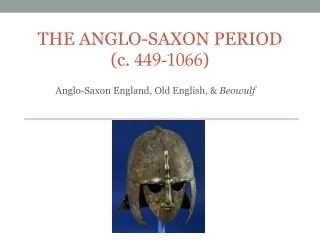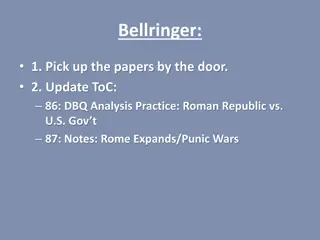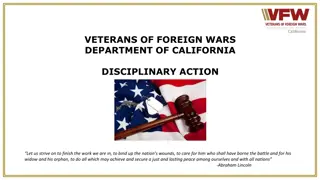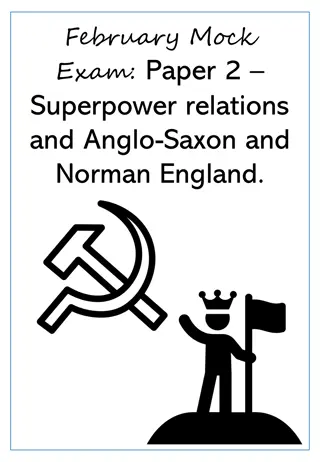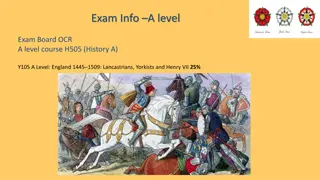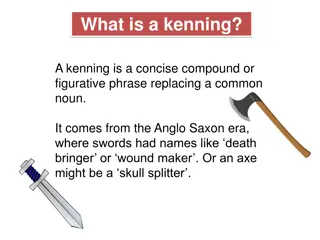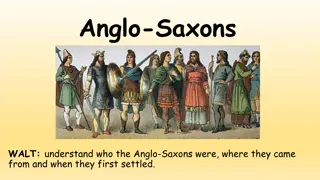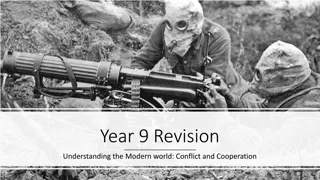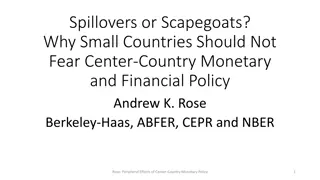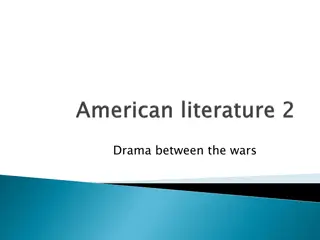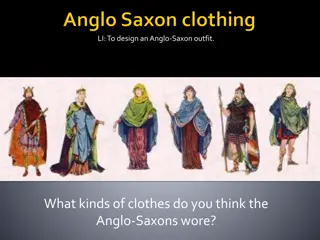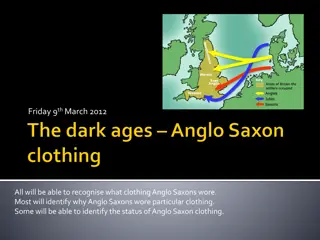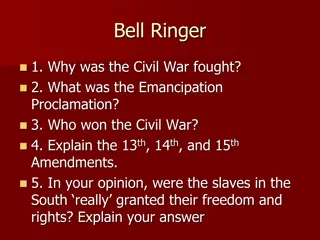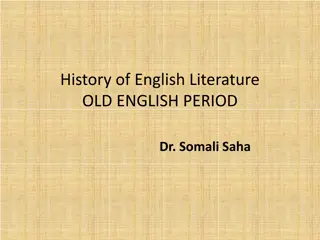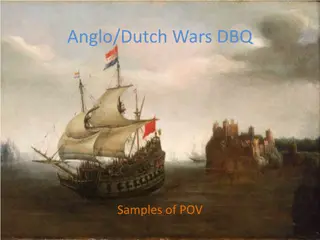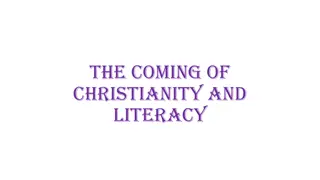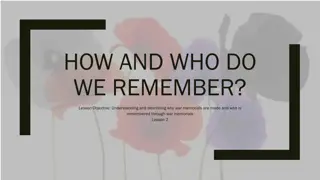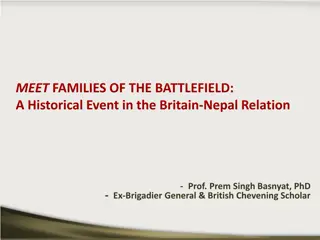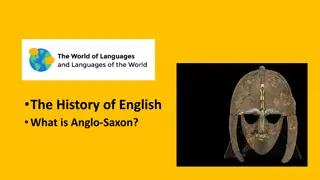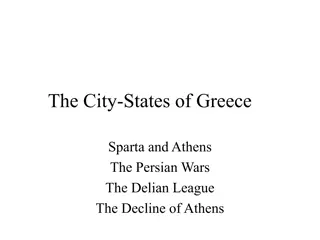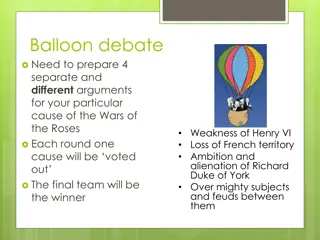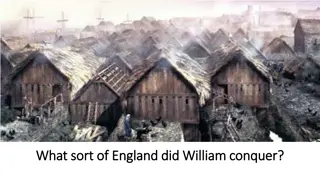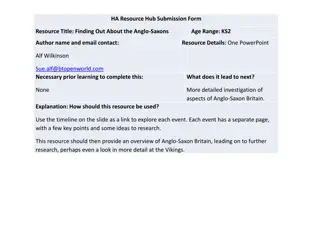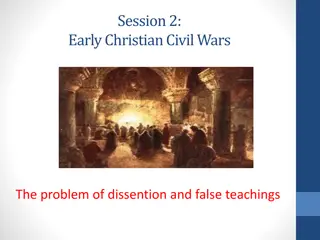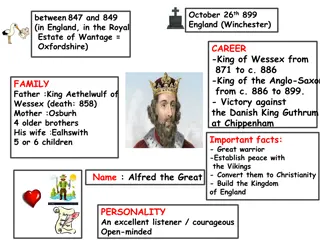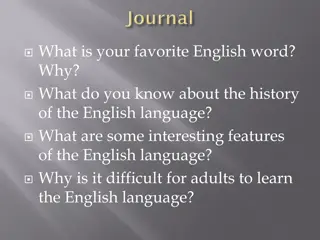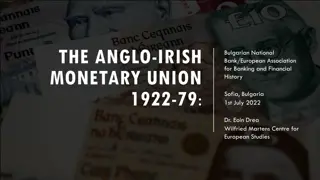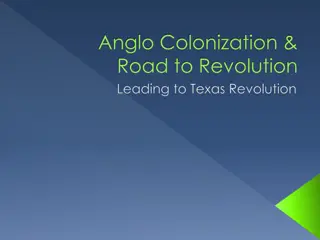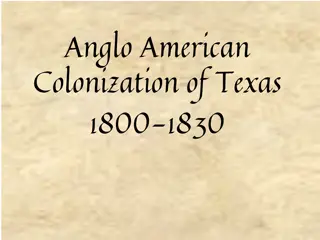The Anglo-Saxon Period: Migration and Integration in Angleland
The Anglo-Saxon period (c. 449-1066) in England saw a dynamic interplay of various cultures, including the Celts, Romans, and Germanic tribes. The arrival of Angles, Saxons, Jutes, and others led to the formation of Angleland (England), with societal structures based on heroic ideals like courage an
2 views • 20 slides
Anglo-Maratha Wars: A Historical Overview
The Anglo-Maratha Wars were a series of conflicts between the British East India Company and the Maratha Empire in India, spanning three wars from 1775 to 1818. The wars resulted in significant territorial changes and power shifts in the region, shaping the history of India during that period.
0 views • 10 slides
Roman Republic Expansion and Punic Wars Overview
Learn about the Roman Republic's expansion from 350 B.C.E. to 150 B.C.E., including their policies towards conquered territories, trade networks, and conflicts with Carthage in the Punic Wars. Explore key aspects of Roman society, politics, economics, and culture during this period through bellringe
1 views • 32 slides
Veterans of Foreign Wars Department of California Disciplinary Actions Overview
The Veterans of Foreign Wars Department of California enforces disciplinary actions outlined in Bylaws Section 710 and Manual of Procedure Section 211 for non-compliance, violations, and other issues. Inspections, costs, triggers for action, and ways to prevent such actions are highlighted in the gu
0 views • 21 slides
Anglo-Saxon, Norman England, and Superpower Relations Study Plan
Year 11 homework schedule and revision plan covering topics such as Anglo-Saxon and Norman England, Superpower Relations, Cold War events, and key historical figures. Resources include BBC Bitesize, Seneca, and GCSEPod for comprehensive study material and quizzes.
0 views • 12 slides
Wars of the Roses (1445-1461): Source Analysis on the Downfall of Henry VI
This content delves into the Wars of the Roses period (1445-1461) in England, focusing on the outbreak of conflicts, political turmoil, and the downfall of Henry VI. It includes an inquiry topic, sample paper question, and a detailed analysis of a historical source (Source A) by Jack Cade regarding
0 views • 16 slides
Life as an Anglo-Saxon Child - Insights and Imaginations
Delve into the world of Anglo-Saxon children through reflections, images, and challenges. Explore the daily life, chores, education, and pastimes through a creative diary entry challenge. Unveil the intricacies of their upbringing in an engaging and informative journey into the past.
5 views • 13 slides
Creating an Anglo-Saxon House Drawing: A Step-by-Step Guide
Explore the world of Anglo-Saxon houses through a series of activities designed to help you draw your own representation. Follow instructional videos and resources to learn various techniques like drawing 3D shapes, using vanishing points for perspective, and shading to depict different building mat
0 views • 7 slides
Kennings for Granddad - A Poetic Tribute in Anglo-Saxon Style
Dive into the ancient art of kennings with a playful tribute to Granddad, creatively capturing his everyday actions with descriptive phrases like "armchair hogger" and "history homework helper." Explore the imaginative world of figurative language reminiscent of the Anglo-Saxon era in this unique po
0 views • 4 slides
Origins and Migration of the Anglo-Saxons
The Anglo-Saxons originated from Denmark, Germany, and the Netherlands, arriving in England via wooden boats to establish themselves as warrior-farmers. This invasion led to the Angles and Saxons dominating and merging into the Anglo-Saxons, who settled in Britain for reasons such as conquest, farmi
0 views • 8 slides
Crime and Punishment in Anglo-Saxon Times
Life in Anglo-Saxon Britain (410-1066CE) involved small village living, limited urbanization, community policing, and unique forms of justice like trials by ordeal and weregild fines for crimes. The system was decentralized, with neighbors and tithings responsible for law enforcement and punishment
0 views • 8 slides
Anglo-French Conflict in Carnatic Wars: A Historical Overview
The Carnatic Wars were a series of conflicts between the British and French in India during the 18th century, fueled by commercial and colonial rivalries. The wars lasted for two decades, with battles and power struggles in regions such as Tamil Nadu and Pondicherry. The Treaty of Pondicherry in 175
0 views • 16 slides
Carnatic Wars in the 18th Century: Conflict between Indian and British East India Companies
Carnatic Wars were a series of military conflicts in the mid-18th century between the Indian Company, British East India Company, and various independent rulers. Total of three wars were fought - First Carnatic War (1746-48), Second Carnatic War (1749-1754), and Third Carnatic War (1757-1763). The w
1 views • 12 slides
Exciting Incentives for Popcorn Sales 2019
Explore a variety of rewards and incentives for popcorn sales in 2019, including Amazon gift cards, scholarships, Chicago Wolves tickets, Star Wars movie screenings, and more. Scouts have the opportunity to earn fantastic prizes through sales achievements and special programs. From Golden Ticket sca
0 views • 11 slides
Understanding the Modern World: Conflict and Cooperation in Year 9 Revision
This revision material covers various aspects of conflicts and cooperation in the modern world, focusing on World War I and World War II. It discusses the causes of both wars, life changes during the wars, the rise of totalitarian governments, the Holocaust, British involvement in WWI, trench warfar
0 views • 10 slides
Reflections on Wars and Human Nature: Insights from "Lord of the Flies
World Wars I and II have left lasting impacts on society, economy, and culture. "Lord of the Flies," written in the aftermath of WWII, delves into themes of the brutality of war, the defects of human nature, and the struggle between civilization and savagery. Through allegorical, religious, psychoan
3 views • 11 slides
Small Countries' Resilience Against Center-Country Monetary Policies
Small countries should not fear the monetary and financial policies of larger center countries. This article discusses the potential spillovers of unconventional monetary policies by center countries, such as quantitative easing and negative nominal interest rates. It explores the concept of currenc
0 views • 39 slides
Drama Between the Wars: Evolution of American Theater
Exploring the evolution of American drama between the wars, from the Puritan rejection of theater to the emergence of American playwrights and the influence of European masters. The rise of popular forms like vaudeville and the impact of theatrical companies post-WWI, with a focus on key figures lik
0 views • 10 slides
Anglo-Saxon Clothing: Design and Comparison with Modern Attire
Explore the clothing worn by Anglo-Saxons, including details on men's and women's outfits, accessories, and footwear. Learn about the similarities and differences between Anglo-Saxon attire and modern clothing styles. Get inspired to design an everyday outfit following Anglo-Saxon fashion, with a fu
0 views • 6 slides
Discovering Anglo-Saxon Clothing: Materials and Styles
Explore the clothing worn by Anglo-Saxons, including materials like wool and natural fibers, and different styles for men and women. Learn about tunics, dresses, leggings, brooches, and more. Get creative by designing your own Anglo-Saxon outfit for a party using the inspiration from historical imag
0 views • 9 slides
Texas Frontier Wars: A Historical Overview
Explore the conflict and interactions between Native Americans and Anglo-Americans in Texas through key events like the Civil War, Emancipation Proclamation, and the influence of important figures like Kiowa Chief Sitting Bear and Comanche Chief Quanah Parker.
0 views • 16 slides
Overview of Anglo-Saxon Literature in Old English Period
The Old English period in English literature, dominated by the Anglo-Saxons, showcased a rich tapestry of poetic works, notable authors, and distinct dialects. Key literary features include pagan and Christian elements, as seen in epic poems like Beowulf and Caedmonian Poems. Additionally, the perio
0 views • 11 slides
Historical Perspective on Actuaries and Underwriters: The Rose Wars
Delve into the intriguing parallels between the civil wars of the Roses in medieval England and the modern conflicts in the insurance industry, exploring themes of rivalry, symbolism, and the role of key figures like Christian Irgens and Bill Gates. Uncover how historical events can offer insights i
0 views • 25 slides
Perspectives on Anglo-Dutch Wars: Documents and Views
Documents from English ambassador Sir George Downing and an anonymous pamphlet published in the Dutch Republic offer contrasting perspectives on the financial burdens and priorities during the Anglo-Dutch Wars. Sir Downing highlights the financial strain on the Dutch provinces, specifically Holland,
0 views • 26 slides
The Impact of Christianity and Literacy on Anglo-Saxon England
The arrival of Christianity in Anglo-Saxon England by missionaries led by St. Augustine brought about significant cultural and linguistic changes, including the introduction of literacy and the Roman alphabet. This transformation facilitated the spread of European culture, influencing the adoption o
0 views • 14 slides
Understanding War Memorials: How and Who We Remember
In this lesson, students explore the significance of war memorials in remembering those who sacrificed during wars. They analyze various war memorials, reflect on who is remembered and consider those who may have been left out. Through engaging activities and discussions, the lesson deepens understa
0 views • 9 slides
Anglo-Nepal Relations: A Historical Perspective
Explore the historical events in the relationship between Britain and Nepal through the lens of Prof. Prem Singh Basnyat, tracing back to the beginnings of Anglo-Nepal physical relations and the Anglo-Nepal War. Discover the dynamics of power, conquest, and diplomacy that shaped the interactions bet
0 views • 33 slides
The Influence of Anglo-Saxon Language on Modern English
Explore the roots of Modern English in the Anglo-Saxon period, where Germanic tribes like the Angles, Saxons, and Jutes shaped the language, culture, and politics of the British Isles over 600 years. Discover how Old English, though different from present-day English, still influences a significant
1 views • 12 slides
Ancient Greece: City-States, Wars, and Culture
Explore the fascinating world of Ancient Greece through the lens of city-states like Sparta and Athens, the epic Persian Wars, the influential Delian League, and the educational systems that shaped brave soldiers and intellectuals. Discover the rise and decline of Athens, the significance of polis i
0 views • 21 slides
Unveiling the Maratha Empire: Insights into Shivaji Maharaj's Achievements and the Rise of Maratha Power
Delve into the historical background of the Maratha Empire, focusing on the early activities and victories of Chhatrapati Shivaji Maharaj, including the Javali expedition and the siege of Panhala. Explore the political, social, economic, cultural, and religious facets that shaped the rise of Maratha
0 views • 5 slides
Wars of the Roses: A Debate for Victory
Prepare your arguments for the Balloon Debate based on causes of the Wars of the Roses, focusing on weaknesses of Henry VI, loss of French territory, ambition and alienation of Richard Duke of York, and overmighty subjects and feuds between them. Dive into historical events, battles, and characters
0 views • 12 slides
Connections, Succession, and Trade: Insights into Anglo-Saxon England
Anglo-Saxon England in 1066 was a centralized, efficient kingdom vulnerable to invasion. Professor Stephen Baxter discusses the attractive nature of the society to invaders due to its centralization and wealth. The family tree of the Kings of England reveals intricate connections, successions, and a
0 views • 9 slides
Unlocking the World of Anglo-Saxons through Interactive Exploration
Delve into the fascinating realm of Anglo-Saxon England using this interactive PowerPoint resource. Explore key events, ask thought-provoking questions, and access valuable online resources to deepen your understanding. Ideal for KS2 students seeking to uncover the mysteries of this historical perio
0 views • 25 slides
Early Christian Civil Wars: Understanding Dissension and False Teachings
The early Christian congregations faced internal conflicts in the form of theological and leadership wars. These disputes were largely driven by personalities, as revealed in various New Testament writings. Questions for reflection are posed regarding encountering false teachings, managing civil war
0 views • 25 slides
Biography of Alfred the Great: King of Wessex and Anglo-Saxon
Alfred the Great, born in England in 847, was a renowned warrior and peacemaker who ruled both Wessex and Anglo-Saxon territories. He achieved a significant victory against the Danish King Guthrum and was known for establishing peace with the Vikings, converting them to Christianity, and strengtheni
0 views • 4 slides
Evolution of the English Language: From Celts to Anglo-Saxons
The English language has evolved from the ancient Celts through the Roman Empire and Anglo-Saxon invasions. Influences from Latin, Greek, and Germanic languages have shaped modern English. Explore the history and cultural impacts of these civilizations on the development of the English language.
0 views • 21 slides
Evolution of Irish Monetary Policy 1922-79: Economic Realities and Policy Approach
The Anglo-Irish Monetary Union saw Ireland navigate economic challenges and dependency on the UK from 1922-79. The incremental approach to currency and banking policy, along with the establishment of the Central Bank of Ireland, shaped the country's financial landscape. Key milestones included the A
0 views • 12 slides
From Anglo Colonization to Texas Revolution: A Journey Westward
Anglo Colonization and the road to revolution led to the Texas Revolution as American settlers moved west, disregarding Spanish authority and sparking conflicts. Empresarios played a role in land distribution, while figures like Augustus Magee and Bernardo Gutierrez fought for Texas independence. Tr
0 views • 18 slides
Anglo-American Colonization of Texas: Settlement and Control by Spain
Anglo-Americans began moving westward after the United States gained independence, leading to an increased interest in Texas due to its abundant land and opportunities. However, Spain sought to control American immigration by offering land grants with conditions such as pledging loyalty and converti
0 views • 34 slides
Exploring Iconography and Metal-Smithing Techniques of the Anglo-Saxon Era
Delve into the rich symbolism and cultural connections of the Anglo-Saxon period through images and descriptions of Saxon wolf symbolism, Staffordshire sword seax hilt, Suffolk bracteate, Roman and Saxon iconography mix, Celtic connections, and Celtic wolf motifs. Discover the intricate details of h
0 views • 16 slides
